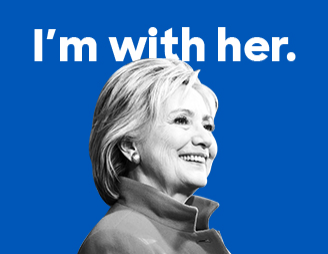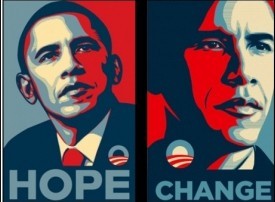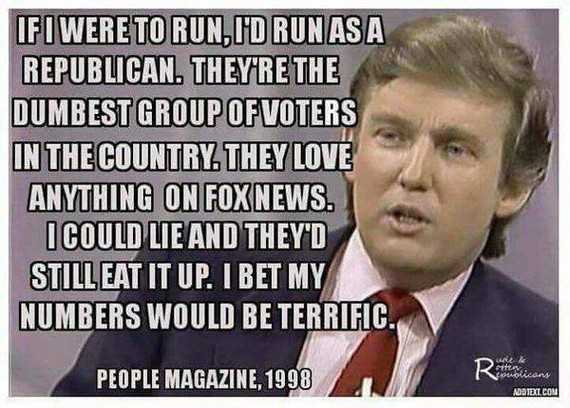
In a recent Washington Post article, Callum Borchers tries to argue that the "nasty effect" is responsible for what he claims to be the unexpected phenomenon where media observations about problems, inconsistencies, contradictions and outright falsehoods by Donald Trump don't seem to matter. The phenomenon which the Washington Post article describes is real. The causal mechanisms which Mr. Borchers asserts are wrong -- they overlook the vital basic fact about the Donald Trump candidacy.
Donald Trump is successfully running a "He's with me" campaign. All of the other candidates are running an "I'm with her" campaign. The difference between these two campaigns is what will make the 2016 election.
Traditional candidates such as Hillary Rodham Clinton run "I'm with her" campaigns. By "I'm with her" (which actually is HRC's campaign slogan) the campaign defines the candidate using a set of archetypal stories, policy positions, and public appearances. That definition is presented to the public, and the candidate asks supporters to identify with the position. In effect, the definition of the candidate becomes a sorting mechanism -- one either agrees with the prevailing definition or one does not. HRC, at this point in time, has similar negatives in terms of numbers as Donald Trump. But, HRC has nowhere near the fierce loyalty displayed by the Trump supporters. HRC is well defined -- you are with her or you are not.
Deviant politicians, deviant candidates, who seek to challenge the powers that be are not stuck running "I'm with her" campaigns. Indeed, HRC faced such a deviant candidate in 2008. Barack Obama campaigned not on details but on the possibility of hope and change. Hope and change are and were vague. That vagueness allowed Obama supporters to see in the slogan whatever it was that they were hoping to have accomplished as a goal.
Supporters' hopes and dreams were the promise of candidate Obama. Not specifics. Not a definition. But the individual hopes and dreams of the individual supporters. And, much of the reason for Pres. Obama's current low popularity ratings are his failure to deliver on those individual hopes and dreams. In 2008, Barack Obama successfully ran a "He's with me" campaign.
In 2016, it is Donald Trump who is running the "He's with me" campaign. The vague promises to make America great again ... I will make you feel good ... I express your anger ... I am your vehicle .. are all Donald-isms for "He's with me." "He's with me" will beat "I'm with her" every time.
When the media writes what they believed to be explanatory or revelatory articles about some position or statement by Donald Trump, the media makes the mistake of thinking they are affecting the definition of Mr. Trump held by his supporters. But, it is simply not true. While in the traditional "I'm with her" campaign third-party revelations and explanations (if coming from what is perceived to be a credible source) can and will impact how supporters and non-supporters define a candidate.
Not so in the "He's with me" campaign. Only in those rare instances where the media article directly addresses the individual goal of a particular individual supporter and appears to explain or reveal something about the likelihood of the "He's with me" candidate helping that individual achieve that goal will such media articles have the effect which Mr. Borchers seems to believe media articles are supposed to have. Such articles about Mr. Trump have been very rare including this false internet meme supposedly about Trump:
The Trump campaign has based its success on metaphors and abstractions and on being able to listen to the un-embodied hopes and fears of his potential supporters. You cannot defeat a metaphor with an in-depth policy analysis. Not in our age of keywords, tweets and emoji's.
Media writers, such as Mr. Borchers, are writing to a thinking audience. Mr. Trump is campaigning to an emotional audience. Crowd effects seldom happen to the thinking (group-think aside), while they often happen to the emotional.
If any headway is to be made by media reporting on "what is wrong" with Trump, it needs to deal with emotional context not in-depth policy. Until then Trump's "He's with me" will trump everyone else's "I'm with her."
This post originally appeared on Medium.




